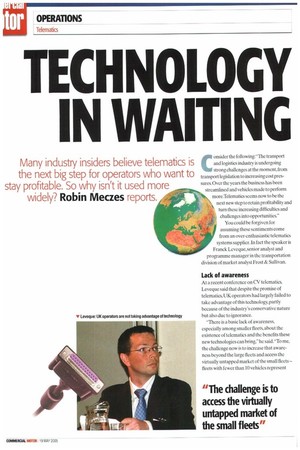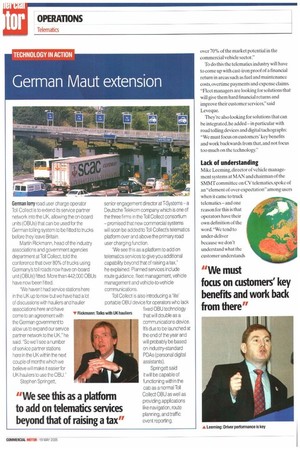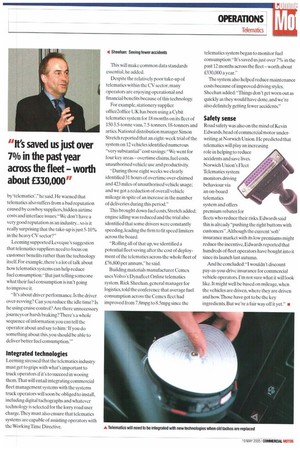TECHNOLOGY IN WAITING
Page 60

Page 62

Page 63

If you've noticed an error in this article please click here to report it so we can fix it.
Many industry insiders believe telematics is the next big step for operators who want to stay profitable. So why isn't it used more
widely? Robin Meczes reports. Consider the following: "The transport and logistics industry is undergoing strong challenges at the moment,from transport legislation to increasing cost pressures. Over the years the business has been streamlined and vehicles made to perform more.Telematics seems now to be the next new step to retain profitability and , turn these increasing difficulties and challenges into opportunities."
You could be forgiven for assuming these sentiments come from an over-enthusiastic telematics systems supplier. In fact the speaker is Franck Leveque, senior analyst and programme manager in the transportation division of market analyst Frost & Sullivan.
Lack of awareness
At a recent conference on CV telematics, Leveque said that despite the promise of telematics, UK operators had largely failed to take advantage of this technology,partly because of the industry's conservative nature but also due to ignorance.
"There is a basic lack of awareness, especially among smaller fleets, about the existence of telematics and the benefits these new technologies can bring," he said."To me, the challenge now is to increase that awareness beyond the large fleets and access the virtually untapped market of the small fleets — fleets with fewer than 10 vehicles represent German lorry road user charge operator Toll Collect is to extend its service partner network into the UK, allowing the on-board units (OBUs) that can be used for the German tolling system to befitted to trucks before they leave Britain.
Martin Rickmann, head of the industry associations and government agencies department at Toll Collect, told the conference that over 80% of trucks using Germany's toll roads now have on-board unit (OBUs) fitted. More than 442,000 OBUs have now been fitted.
"We haven't had service stations here in the UK up to now but we have had a lot of discussions with hauliers and haulier associations here and have come to an agreement with the German government to allow us to expand our service partner network to the UK," he said. "So we'll see a number of service partner stations here in the UK within the next couple of months which we believe will make it easier for UK hauliers to use the OBU."
Stephen Springett, senior engagement director at T-Systems — a Deutsche Telekom company which is one of the three firms in the Toll Collect consortium — promised that new commercial systems will soon be added to Toll Collect's telematics platform over and above the primary road user charging function.
"We see this as a platform to add on telematics services to give you additional capability beyond that of raising a tax," he explained. Planned services include route guidance, fleet management, vehicle management and vehicle-to-vehicle communications.
Toll Collect is also introducing a 'lite' portable OBU device for operators who lack fixed OBU technology that will double as a communications device. It's due to be launched at the end of the year and will probably be based on industry-standard PDAs (personal digital assistants).
lks with UK hauliers
Springett said it will be capable of functioning within the cab as a normal Toll Collect OBU as well as providing applications like navigation, route planning, and traffic event reporting. over 70% of the market potential in the commercial vehicle sector."
To do this the telematics industry will have to come up with cast-iron proof of a financial return in areas such as fuel and maintenance costs,overtime payments and expense claims. "Fleet managers are looking for solutions that will give them hard financial returns and improve their customer services," said Leveque.
They're also looking for solutions that can be integrated, he added — in particular with road tolling devices and digital tachographs: "We must focus on customers' key benefits and work backwards from that, and not focus too much on the technology."
Lack of understanding
Mike Leeming, director of vehicle management systems at MAN and chairman of the SM,MT committee on CV telematics, spoke of an "element of over-expectation" among users when it came to truck telematics — and one reason for this is that operators have their own definition of the word."We tend to under-deliver because we don't understand what the customer understands by 'telematics'," he said. He warned that telematics also suffers from a bad reputation caused by cowboy suppliers, hidden airtime costs and interface issues: -We don't have a very good reputation as an industry... so is it really surprising that the take-up is just 5-10% in the heavy CV sector?"
Leeming supported Leveque's suggestion that telematics suppliers need to focus on customer benefits rather than the technology itself. For example, there's a lot of talk about how telematics systems can help reduce fuel consumption:"But just telling someone what their fuel consumption is isn't going to improve it.
"It's about driver performance. Is the driver over-revving? Can you reduce the idle time? Is he using cruise control? Are there unnecessary journeys or harsh braking? There's a whole sequence of information you can tell the operator about and say to him: 'if you do something about this, you should be able to deliver better fuel consumption."
Integrated technologies Leeming stressed that the telematics industry must get to grips with what's important to truck operators if it's to succeed in wooing them,That will entail integrating commercial fleet management systems with the systems truck operators will soon be obliged to install, including digital tachographs and whatever technology is selected for the lorry road user charge.They must also ensure that telematics systems are capable of assisting operators with the Working Time Directive. This will make common data standards essential, he added.
Despite the relatively poor take-up of telematics within the CV sector,many operators are enjoying operational and financial benefits because of this technology.
For example, stationery supplier office2office UK has been using a Cybit telematics system for 18 months on its fleet of 150 3.5-tonne vans,7.5-tonners,18-tonners and artics. National distribution manager Simon Stretch reported that an eight-week trial of the system on 12 vehicles identified numerous "very substantial" cost savings: "We went for four key areas— overtime claims, fuel costs, unauthorised vehicle use and productivity.
"During those eight weeks we clearly identified 31 hours of overtime over-claimed and 423 miles of unauthorised vehicle usage; and we got a reduction of overall vehicle mileage in spite of an increase in the number of deliveries during this period."
This brought down fuel costs, Stretch added; engine idling was reduced and the trial also identified that some drivers were constantly speeding, leading the firm to fit speed limiters across the board.
"Rolling all of that up, we identified a potential fleet saving after the cost of deployment of the telematics across the whole fleet of £76,800 per annum," he said.
Building materials manufacturer Cemex uses Volvo's Dynafleet Online telematics system. Rick Sheehan, general manager for logistics, told the conference that average fuel consumption across the Cemex fleet had improved from 7.8mpg to 8.5mpg since the telematics system began to monitor fuel consumption:"It's saved us just over 7% in the past 12 months across the fleet — worth about £330,000 a year."
The system also helped reduce maintenance costs because of improved driving styles, Sheehan added:"Things don't get worn out as quickly as they would have done, and we're also definitely getting fewer accidents."
Safety sense Road safety was also on the mind of Kevin Edwards, head of commercial motor underwriting at Norwich Union. Ile predicted that telematics will play an increasing role in helping to reduce accidents and save lives. Norwich Union's Fleet Telematics system monitors driving behaviour via an on-board telematics system and offers premium rebates for fleets who reduce their risks. Edwards said this is already "pushing the right buttons with customers".Although the current `soft' insurance market with its low premiums might reduce the incentive. Edwards reported that hundreds of fleet operators have bought into it since its launch last autumn.
And he concluded:"I wouldn't discount pay-as-you-drive insurance for commercial vehicle operators. I'm not sure what it will look like. It might well be based on mileage, when the vehicles are driven, where they are driven and how. Those have got to be the key ingredients. But we're a fair way off it yet." •














































































































































































































